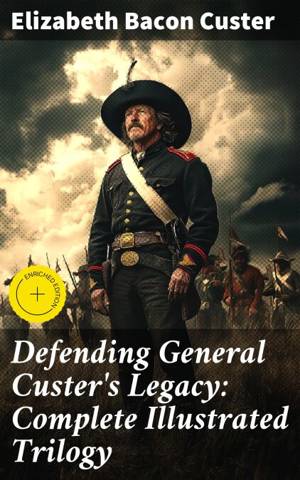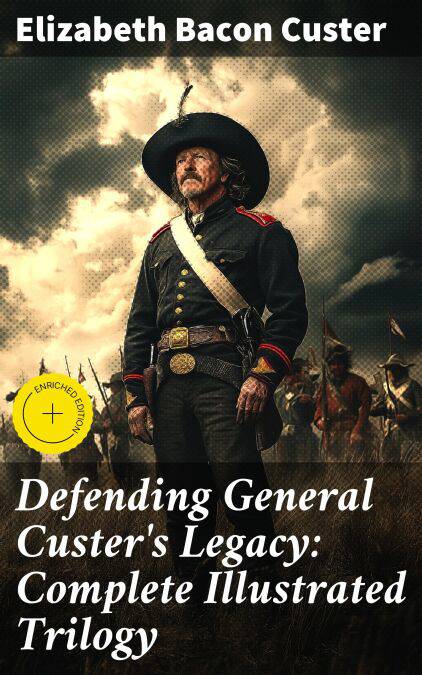
- Afhalen na 1 uur in een winkel met voorraad
- Gratis thuislevering in België vanaf € 30
- Ruim aanbod met 7 miljoen producten
- Afhalen na 1 uur in een winkel met voorraad
- Gratis thuislevering in België vanaf € 30
- Ruim aanbod met 7 miljoen producten
Zoeken
Defending General Custer's Legacy: Complete Illustrated Trilogy E-BOOK
Enriched edition. Boots and Saddles, Tenting on the Plains, Following the Guidon
Elizabeth Bacon Custer
E-book | Engels
€ 1,99
+ 1 punten
Uitvoering
Omschrijving
In "Defending General Custer's Legacy: Complete Illustrated Trilogy," Elizabeth Bacon Custer intricately weaves personal memoir and historical narrative, presenting a compelling defense of her husband, General George Armstrong Custer. This trilogy utilizes both vivid illustrations and poignant prose to navigate the complexities of Custer's character and actions during pivotal military encounters, including the controversial Battle of Little Bighorn. Custer's legacy is contextualized within the broader American narrative of the 19th century, examining themes of valor, heroism, and the moral ambiguities of war, all while reflecting a Romantic literary style that seeks to inspire admiration for the slain general amidst growing historical criticism. Elizabeth Bacon Custer, intimately acquainted with the subject, was not only Custer's wife but also a formidable figure in her own right. Her firsthand experiences, coupled with her keen insight into the social and political upheavals of her time, provide a rare and invaluable perspective on her husband's life and legacy. Through her passionate and often emotional prose, Custer aims to reclaim her husband's reputation from the clutches of historical vilification, portraying him as a misunderstood hero. This trilogy is highly recommended for scholars of American history, military enthusiasts, and those intrigued by the personal dimensions of historical figures. Custer's ardent exploration of memory and legacy illuminates the often-polarizing struggles of historical interpretation, inviting readers to reconsider their perceptions of one of America's most controversial soldiers.
In this enriched edition, we have carefully created added value for your reading experience:
- A comprehensive Introduction outlines these selected works' unifying features, themes, or stylistic evolutions.
- A Historical Context section situates the works in their broader era—social currents, cultural trends, and key events that underpin their creation.
- A concise Synopsis (Selection) offers an accessible overview of the included texts, helping readers navigate plotlines and main ideas without revealing critical twists.
- A unified Analysis examines recurring motifs and stylistic hallmarks across the collection, tying the stories together while spotlighting the different work's strengths.
- Reflection questions inspire deeper contemplation of the author's overarching message, inviting readers to draw connections among different texts and relate them to modern contexts.
- Lastly, our hand‐picked Memorable Quotes distill pivotal lines and turning points, serving as touchstones for the collection's central themes.
In this enriched edition, we have carefully created added value for your reading experience:
- A comprehensive Introduction outlines these selected works' unifying features, themes, or stylistic evolutions.
- A Historical Context section situates the works in their broader era—social currents, cultural trends, and key events that underpin their creation.
- A concise Synopsis (Selection) offers an accessible overview of the included texts, helping readers navigate plotlines and main ideas without revealing critical twists.
- A unified Analysis examines recurring motifs and stylistic hallmarks across the collection, tying the stories together while spotlighting the different work's strengths.
- Reflection questions inspire deeper contemplation of the author's overarching message, inviting readers to draw connections among different texts and relate them to modern contexts.
- Lastly, our hand‐picked Memorable Quotes distill pivotal lines and turning points, serving as touchstones for the collection's central themes.
Specificaties
Betrokkenen
- Auteur(s):
- Uitgeverij:
Inhoud
- Aantal bladzijden:
- 814
- Taal:
- Engels
Eigenschappen
- Productcode (EAN):
- 8596547776529
- Verschijningsdatum:
- 12/12/2023
- Uitvoering:
- E-book
- Beveiligd met:
- Digital watermarking
- Formaat:
- ePub

Alleen bij Standaard Boekhandel
+ 1 punten op je klantenkaart van Standaard Boekhandel
Beoordelingen
We publiceren alleen reviews die voldoen aan de voorwaarden voor reviews. Bekijk onze voorwaarden voor reviews.








